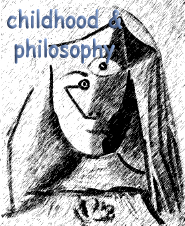the childhood of teaching and learning: inventing with and as a child the art of being a teacher
DOI:
https://doi.org/10.12957/childphilo.2020.51709Keywords:
invention, childhood, teacher, philosophyAbstract
this article seeks to approach the challenge of inventing oneself as a teacher through the eyes of childhood—a human dimension characterized by intensity, full of possibilities, connecting the movement of invention to the challenges encountered in day-to-day learning and teaching in school spaces. From that encounter with childhood, it is possible to create new perspectives and clues that can contribute to the development of eyes capable of seeing, "unraveling", "overturning" the world--in other words, seeing the world from several angles not yet explored, with new childlike lenses. This approach is potent enough potent to bring to life educational activities that provoke the teacher, in the complex art of building or inventing themselves, and developing the capacity to preserve the creativity of children of all ages. This perspective enables the act of thinking to be experienced in infinite and unimaginable ways, not only enriching but also transforming the practices and knowledge that inhabit the time of searching—the time of becoming teacher, becoming learner, becoming school. This paper does not seek to provide answers to the challenges and concerns presented, but, it is intended to be a careful exercise of looking at the issues that directly or indirectly affect the journey of all who venture out and challenge themselves to build educational experiences committed to the transformation and creation of other ways of relating to childhood, with children, with school, in short, with the very invention of the self, as an art of traversing the paths along which one becomes an educatorinvention, childhood, teacher, philosophyDownloads
References
ALVES, Rubem. Conversas sobre educação. 10.ed. São Paulo: Verus Editora, 2010.
BARROS, Manoel de. Exercícios de ser criança. Rio de Janeiro: Salamandra, 1999.
__________. Poemas rupestres. Ilustração de Martha Barros. 2. ed. Rio de Janeiro: Best Seller, 2006.
__________. Menino do mato. São Paulo: Leya, 2010.
__________. O livro das ignorãças. Rio de Janeiro: Alfaguara, 2016.
FREIRE, Paulo. Pedagogia do Oprimido. 25. ed. Rio de Janeiro: Paz e Terra, 1998.
KOHAN, Walter Omar. Infância: entre educação e filosofia. 1.ed. Belo Horizonte: Autêntica, 2005.
__________. Infância, estrangeiridade e ignorância - Ensaios de filosofia e educação. Belo horizonte: Autêntica, 2007.
_______. Filosofia: o paradoxo de aprender e ensinar. Coleção Ensino de filosofia. Belo Horizonte: Autêntica, 2009.
_______. Palavras, passos e nomes para um projeto. In: KOHAN, Walter Omar; OLARIETA, Beatriz Fabiana (Orgs). A escola pública aposta no pensamento. (Coleção Ens. Fil. 4). Belo Horizonte: Ed. Autêntica, 2012.
__________. Pensar com Heráclito. (Org. e Trad.) Rio de Janeiro: Lamparina, 2013.
__________. Paulo Freire: outras infâncias para a infância. Educação em Revista, v.34. Belo Horizonte, 2018.
__________. Paulo Freire, mais do que nunca: uma bibliografia filosófica. Belo Horizonte: Vestígio, 2019.
LARROSA, Jorge. Nietzsche & a Educação. Traduzido por Semíramis Gorini da Veiga. 3. ed. Belo Horizonte: Autêntica Editora, 2009.
__________. Tremores: escritos sobre experiência. Tradução ANTUNES, Cristina; GERALDI, João Wanderley. 1. ed. Belo Horizonte: Autêntica, 2014.
IGLÉSIAS, Maura. O que é filosofia e para que serve. In: REZENDE, Antonio (Org). Curso de filosofia: para professores e alunos dos cursos de segundo grau e de graduação. 13. ed. Rio de Janeiro: Jorge Zahar, 2005.
MELO, Danilo Augusto Santos. Palavras, passos e nomes para um projeto. In: KOHAN, Walter Omar; OLARIETA, Beatriz Fabiana (Orgs). A escola pública aposta no pensamento. (Coleção Ens. Fil. 4). Belo Horizonte: Ed. Autêntica, 2012.
NIETZSCHE, Friedrich. Assim falou Zaratustra: um livro para todos e para ninguém. Tradução Carlos Duarte e Anna Duarte. São Paulo: Martin Claret, 2014.
RANCIÈRE, Jacques. O mestre ignorante: cinco lições sobre a emancipação intelectual. Tradução de Lílian do Valle. 3. ed. Belo Horizonte: Autêntica, 2013.
SAVIANI, Dermeval. Educação: do senso comum à consciência filosófica. 19.ed. São Paulo: Autores Associados, 2013.




